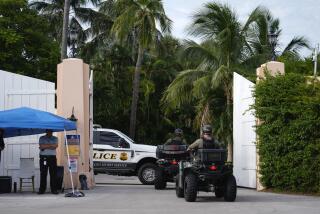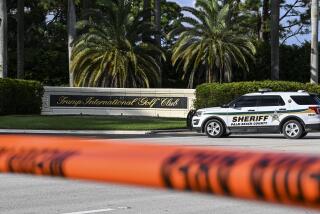Trump says he’ll review case of Matt Golsteyn, a veteran facing a murder charge
President Trump tweeted Sunday that he will review the case of a former Special Forces officer and Afghanistan war veteran who was notified last week that he will face a murder charge in the death of a detainee suspected of being a Taliban bomb maker.
Army Maj. Mathew Golsteyn was notified Thursday by the Army that he will face one charge of murder, his attorney and the Army said. The military has been investigating him since 2011, when Army officials said he confessed during a polygraph test as part of a CIA job interview to killing the suspected bomb maker in February 2010.
“At the request of many, I will be reviewing the case of a ‘U.S. Military hero,’ Major Matt Golsteyn, who is charged with murder,” Trump tweeted. “He could face the death penalty from our own government after he admitted to killing a Terrorist bomb maker while overseas.”
It wasn’t clear Sunday what Trump’s “review” could comprise or whether he is considering pardoning Golsteyn if the Army convicts him of murder.
The White House did not respond to questions seeking clarity on the president’s Twitter post. The case remains under investigation, with an Article 32 hearing expected next year to review evidence. An Army spokesman, Lt. Col. Loren Bymer, said that Golsteyn was recalled to active duty last week to face the charge.
A Pentagon spokesman, Army Col. Rob Manning, said Sunday that the allegations against Golsteyn are a “law enforcement matter,” and that the Defense Department will “respect the integrity of this process and provide updates when appropriate.”
Trump’s statement alone could complicate the military’s prosecution of Golsteyn. The president, as commander in chief, is expected in the military justice system to not make statements that could influence open cases. Doing so is considered unlawful command influence and can result in cases being thrown out.
Golsteyn’s attorney, Phillip Stackhouse, has disputed that Golsteyn’s statement to the CIA was characterized accurately by the Army.
The service launched an investigation into Golsteyn after the CIA alerted it to his job interview, but closed the inquiry without charging him. But the case was reopened in 2016, after Golsteyn said during a Fox News interview that he had killed a bomb maker, who had been held as a detainee, out of fear that the bomb maker would target Afghans helping U.S. troops if he were let go.
Golsteyn, a 2002 graduate of the U.S. Military Academy at West Point, N.Y., was lauded for his performance in Afghanistan as the commander of a team from 3rd Special Forces Group in the Battle of Marjah. About 15,000 coalition troops fought to take back a poppy-laden section of Helmand province that was controlled by the Taliban and laced with explosives.
On Feb. 20, 2010, Golsteyn coordinated numerous airstrikes and repeatedly braved hostile fire after launching a mission to kill a Taliban sniper who nearly hit a nearby Marine, according to a military summary of his actions. He was later awarded the Silver Star for valor.
The accusations center on actions that occurred two days earlier. Two Marines were killed and others were wounded by a garage door that was booby-trapped with explosives, prompting a search of nearby homes in which Golsteyn’s unit found bomb-making materials and a suspected bomb maker, according to the results of an investigation released to the Washington Post through the Freedom of Information Act in 2015.
Golsteyn later recounted during his CIA job interview that the U.S. troops detained the man and brought him back to their base. While detained, the suspected bomb maker unexpectedly crossed paths with an Afghan tribal leader with whom Golsteyn’s team was working. When the leader expressed fear for his life, Golsteyn said, he grew concerned about the consequences of letting the suspected bomb maker go, according to Army documents.
“CPT Golsteyn related there had been countless times when he detained someone and sent that person to a detention facility only to see that same person shooting at his unit weeks later,” an Army investigator’s summary of Golsteyn’s polygraph test said. “CPT Golsteyn stated he had no qualms about what he did because he couldn’t have lived with himself if [the suspected bomb maker] killed another Soldier or Marine.”
The Army dropped Golsteyn from the Special Forces and stripped him of the Silver Star. The service accused him in a June 2015 administrative hearing of violating the law of armed conflict, but a panel of officers determined that was unsubstantiated. It instead recommended separating him from the military for conduct unbecoming an officer with a general discharge under honorable conditions.
More to Read
Get the L.A. Times Politics newsletter
Deeply reported insights into legislation, politics and policy from Sacramento, Washington and beyond. In your inbox three times per week.
You may occasionally receive promotional content from the Los Angeles Times.










